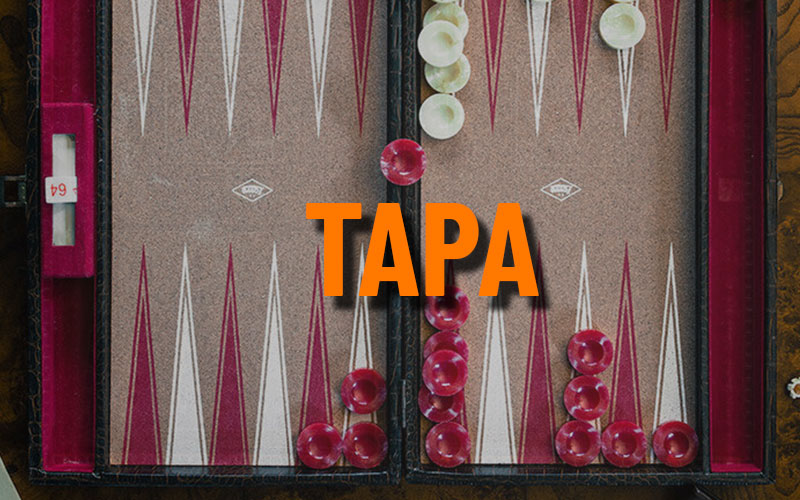
Tapa is a popular version of backgammon played in Bulgaria, where the word tapa means "bottle cap." The goal in this game is to trap your opponent's checkers rather than hit them. The same game is played in Greece, where it is known as Plakoto.
Setup
Each player starts with fifteen checkers on the opponent's one-point. The checkers move around the board in opposite directions as shown in the diagram below.
Object
The object of the game is to bring all your checkers around to your own home board and then bear them off. The first player to bear off all of his checkers wins the game.
To start
Each player rolls one die and the higher number goes first. That player then rolls the dice again to begin his first turn. After the first game, the winner of the previous game goes first.
Movement
The roll of the dice indicates how many points, or pips, the player is to move his checkers. The following rules apply:
- A checker may be moved only to an open point, one that is not occupied by two or more opposing checkers.
- The numbers on the two dice constitute separate moves. For example, if a player rolls 5 and 3, he may move one checker five spaces to an open point and another checker three spaces to an open point, or he may move the one checker a total of eight spaces to an open point, but only if the intermediate point (either three or five spaces from the starting point) is also open.
- Doubles are played twice. For example, a roll of 6-6 means the player has four sixes to use.
- You must use both numbers of a roll if possible, or all four numbers in the case of doubles.
Pinning the opponent
There is no hitting in this game. Instead, if you land on a point occupied by a single opposing checker, the opponent's checker is trapped until you remove your checker. Two of your checkers on a point, or one of your checkers pinning the opponent's checker creates a block which the opponent cannot land or touch down on.
White's checker has come around the board and now pins Red's checker on the seven-point.
Bearing Off
Once you have moved all fifteen of your checkers into your home board, you may begin bearing off. You bear off rolling a number that corresponds to the point on which the checker resides, and then removing that checker from the board.
If there is no checker on the point indicated by the roll, then you must make a legal move using a checker on a higher-numbered point. If there are no checkers on higher-numbered points, you must remove a checker from the highest point that has a checker.
Scoring
The first player to bear off all fifteen checkers wins the game. If the losing player has borne off at least one checker, he loses only one point; otherwise he loses two points ("mars").
There is no doubling in this game.